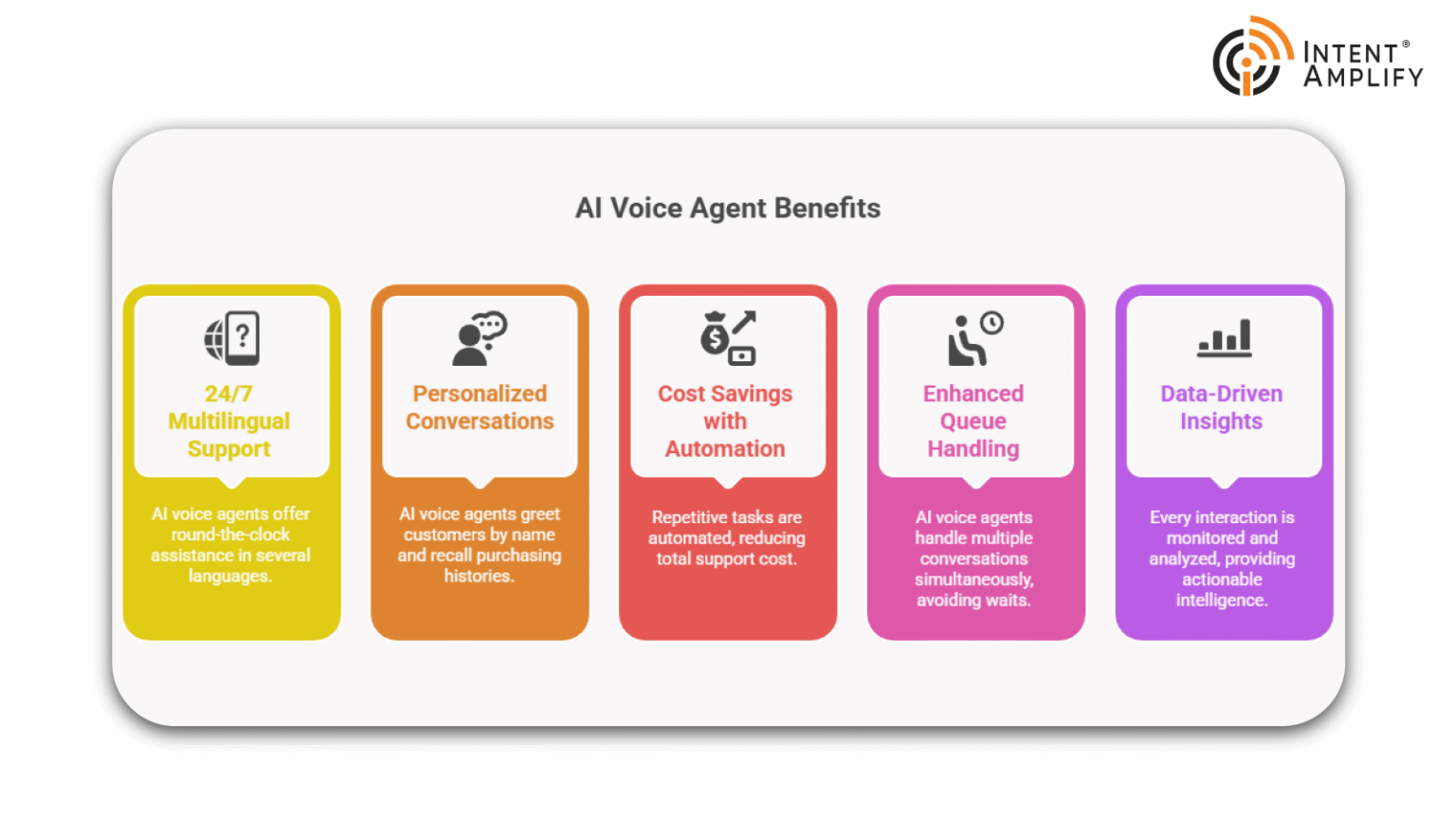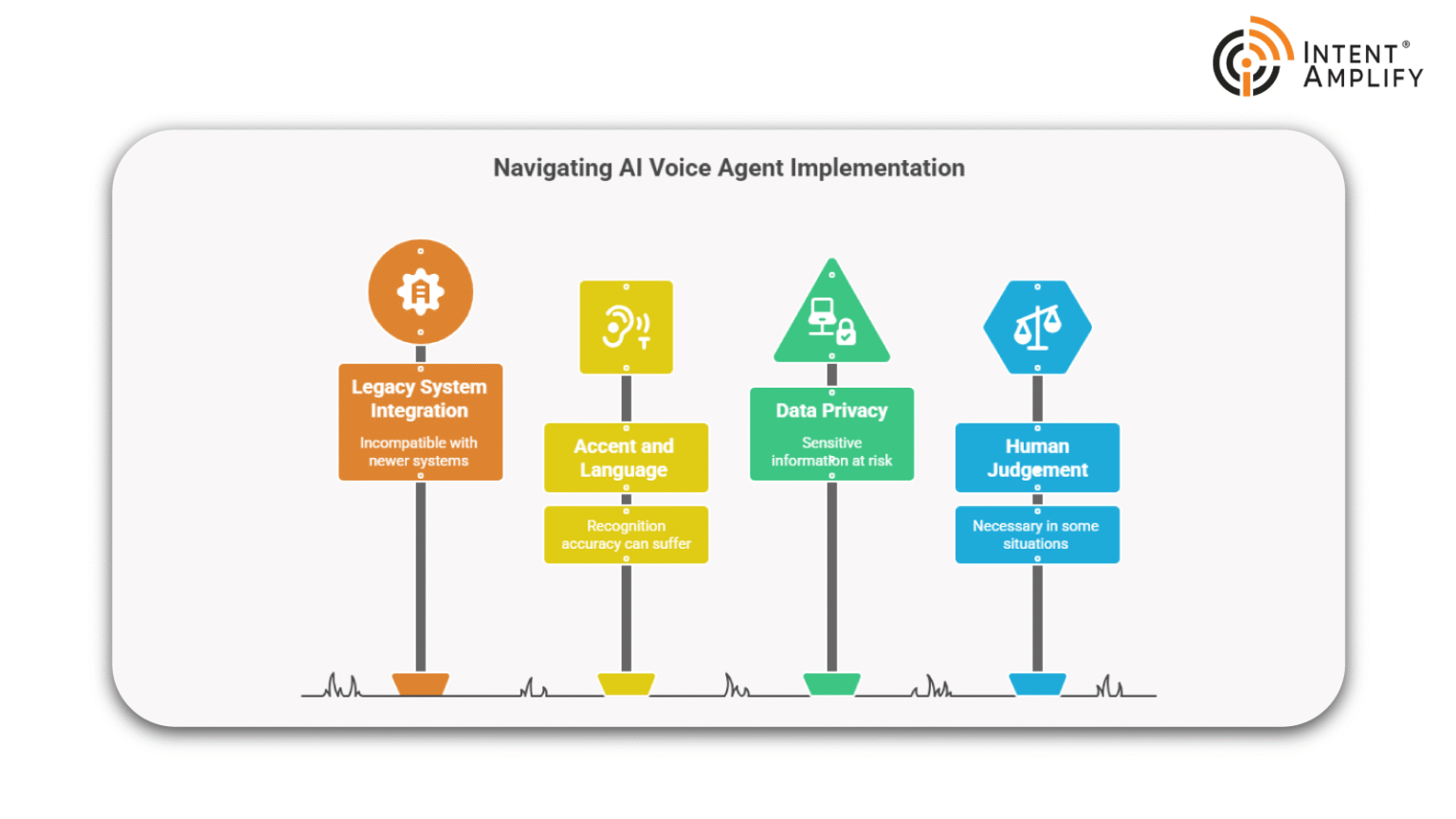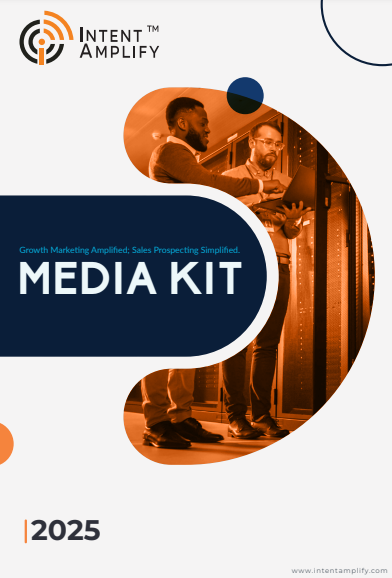An AI voice agent uses NLP and machine learning to provide real-time, context-aware customer support via voice.

How AI Voice Agents Are Changing B2B Customer Support
- Last updated on: August 14, 2025
Customer service in the B2B market is no longer an afterthought back-office process – it’s a strategic corner of client satisfaction, retention, and ultimately, long-term profits. Buyers today expect instant information, one-to-one interaction, and seamless solutions that work together effortlessly across time zones and communication channels. The stakes are huge: one subpar support experience can kill million-dollar transactions.
This is where AI voice agents are coming in as a force multiplier. Driven by the breakthrough in natural language processing (NLP) and machine learning, virtual agents are able to understand context, detect sentiment, and respond with accuracy comparable to human agents and work around the clock.
Unlike ordinary IVR systems or generic chatbots, AI voice agents engage in smooth, natural-sounding conversations. They can solve issues, arrange follow-ups, and even offer personalized responses with client history without human fatigue or inconsistency.
As AI voice agents continue to mature, B2B companies are finding they’re not just a cost-cutting tool; they’re a competitive differentiator. In this article, we’ll explore what AI voice agents are, why they matter for B2B, the benefits they deliver, real-world use cases, and how businesses can implement them successfully to redefine their customer support experience.
Who are AI Voice Agents?
An AI voice agent is a computer-based virtual assistant that uses artificial intelligence to engage with customers via spoken dialogue. Unlike those antiquated, button-press IVR systems, these agents can recognize natural language, comprehend intent, and provide contextually relevant responses in real time.
There are three core technologies behind an AI voice agent:
- Natural Language Processing (NLP): Allows the system to interpret and understand human language, such as jargon and slang.
- Machine Learning (ML): Allows the agent to improve and learn over time based on interactions with users in the past.
- Speech Recognition & Text-to-Speech (TTS): Recognizes voice to interpret into text for processing and then speaks back naturally, in a human-sounding voice.
What sets AI voice agents apart from chatbots is the fact that they can have a real conversation – they pause, request clarification, and even change topics when the customer does. They can be incorporated into CRMs, help desks, and knowledge bases to provide context-aware responses. The adoption trend is picking up speed. 50% of consumers have made a purchase using a voice assistant. With voice technology evolving and being made more widely available, AI voice agents are no longer a future vision – they’re becoming a B2B reality quickly.
Why B2B Businesses Are Adopting AI Voice Agents?
The B2B ecosystem is confronted with several challenges that render AI voice agents especially valuable. Unlike in B2C, where queries are often short and transactional, B2B support has to cope with complex, high-value interactions that may involve multiple stakeholders, contractual agreements, and customized solutions.
The global voice AI agents market is projected to grow from USD 2.4 billion in 2024 to USD 47.5 billion by 2034, reflecting a compound annual growth rate (CAGR) of 34.8%.
Top drivers for adoption are:
- Speedier Resolution for High-Value Customers – AI voice agents can immediately access account information, previous orders, and technical guidelines, making it possible to accelerate the problem-solving process.
- Global Time Zone Coverage – With customers across the globe, companies require 24/7 coverage without the expense of evening shifts or local teams.
- Consistent Quality – Human reps can differ in tone or accuracy, but AI reps provide consistent service every time.
- Scalability Without Added Expenses – Adding more AI “employees” does not add salaries, benefits, or physical real estate.
- Conintegration with Existing Systems – AI voice agents can be used in conjunction with human employees, routing complex problems and resolving run-of-the-mill ones automatically.
In the end, B2B adoption is not just about saving money – it’s about delivering a more efficient, data-driven, and scalable customer service experience that builds trust and strengthens client relationships.
Principal Advantages of AI Voice Agents in B2B Customer Service
The summons of AI voice agents to B2B businesses is not just about novelty. They alleviate pain long suffered by customer support teams and deliver quantifiable business value.
- 24/7 Multilingual Support – Customers worldwide expect 24×7 support irrespective of the time zones involved. AI voice agents never sleep, offering round-the-clock assistance in several languages without any extra workforce.
- Personalized Conversations Through CRM Data – By becoming integrated with customer relationship management (CRM) technology, AI voice agents can greet customers by name, recall purchasing histories, and reply depending on their preference or terms of the contract. This creates a highly personal experience that encourages loyalty.
- Please save on Costs with Automation – Repetitive tasks such as billing queries, account modifications, or basic troubleshooting can be automated, keeping human agents to focus on more complex and revenue-generating tasks. This optimizes utilization and reduces total support cost.
- Enhanced Queue Handling During Peak Volume Hours – AI voice agents can handle multiple conversations simultaneously, avoiding waits and interacting with customers instead of annoying them.
- Data-Driven Insights – Every interaction is monitored and analyzed, providing actionable intelligence into customer behavior, recurring issues, and service blind spots – intelligence that can be applied directly to improve products and processes.
The result is a scalable, repeatable, and insight-led support model that meets B2B needs.
Practical Use Cases in B2B
AI voice agents are not concepts; they already exist to be utilized in industries with real-world results. Below are some practical applications where they shine in B2B customer service:
- Self-Service Client Onboarding – New customers can be guided through start-up processes, account establishment, or product familiarization without waiting for a human agent.
- Handling Everyday Account and Billing Problems – From asking for invoices to payment notifications, AI voice agents can access and send relevant information immediately.
- Product Repairing – For software or hardware products, AI voice agents can walk customers through step-by-step fixes using a knowledge base or technical guide.
- Follow-Up Reminders and Scheduling of Meetings – AI voice agents can book meetings, send follow-up reminders, and even remind on open matters – boosting client engagement.
- Pre-Qualifying Leads Before Human Touch – B2B support calls, in some cases are also offer selling chances. AI voice agents can pick up basic needs, budgetary levels, and timelines before handing over the lead to a sales representative.
When applied strategically, these applications accomplish more than saving time—greater customer satisfaction, operational efficiency, and revenue potential. Enhancing Customer
Experience with AI Voice Agents
Customer experience in B2B isn’t merely a gauge of service – it’s a strong driver of retention and future revenue. AI voice agents bring numerous advantages that improve this experience.
- Lower Wait Times
Instead of being kept on hold in call queues, customers can talk directly with an AI agent that can fulfill their request or redirect them to the relevant human agent.
- Consistent Tone and Correctness
Human speech is affected by mood, fatigue, or training level. AI voice agents offer a consistent, brand-standard tone and give correct information every time.
- Preemptive Service With Data
AI voice agents analyze customer request patterns to anticipate needs. For example, if a client repeatedly calls on an issue that repeats itself, the system can initiate pre-emptive contact before the next issue arises.
- Multichannel Integration
They can operate on phone, web, and mobile app, so customers enjoy an integrated experience regardless of how they want to reach out.
The result is a support culture that is fast, professional, and personalized – a marriage that becomes increasingly hard to achieve with human teams alone.
Implementation Challenges and How to Overcome Them
Though AI voice agents hold revolutionary benefits, they are not problem-free. Businesses must go into implementation with a well-thought-out plan to avoid caveats.
- Legacy System Integration
Legacy CRM or ticketing software may not be seamlessly compatible with newer AI systems. Solution: Choose AI platforms with open APIs and middleware compatibility to bridge the gap.
- Accent and Language Differences
Recognition accuracy can suffer with local accents or technical jargon. Solution: bias the AI with domain vocabulary and sample voice recordings of real customers.
- Data Privacy and Compliance
B2B is associated with sensitive information. Solution: get the AI platform GDPR, CCPA, or industry standard (e.g., HIPAA for healthcare) compliant.
- Human Judgment Necessary
Some situations necessitate human judgment – especially disputes or high-risk negotiations. Solution: implement a hybrid model where AI handles routine work and sends challenging cases to trained staff.
By seeing these challenges coming and preparing for them, companies can get the most out of AI’s potential with the least amount of disruption to current processes.
The Future of B2B Support with AI Voice Agents
The future of AI voice agents is merely at its inception. In the next several years, we will see these systems evolve from reactive troubleshooting to predictive guidance. Imagine a voice agent AI that not only replies to inquiries but also calls a customer to inform them of a potential supply chain delay, suggests maintenance before a blackout, or offers product upgrades based on usage patterns.
Key future advances include:
- Integration with Predictive Analytics: AI will use historical data to predict customer needs before they happen.
- Emotion and Sentiment Detection: Voice agents analyze tone, speech rate, and language to gauge client sentiment and adjust responses in real time.
- Hybrid Human + AI Models: Companies will blend the efficiency of AI with human compassion, providing smooth handovers between virtual and human agents.
- Deeper Industry Customization: AI voice agents will be trained by vertical, allowing for more valuable, pertinent conversations.
To B2B companies, the message is clear: early adopters will not only meet current client demands but also position themselves for future-proof customer service.
The Path to Successfully Implement AI Voice Agents
Adopting AI voice agents is more than purchasing software – it’s about intentional integration into your customer service system.
- Step 1: Examine Current Support Processes – Identify repetitive tasks suitable for AI automation without reducing service quality.
- Step 2: Choose the Right Vendor – Select platforms that integrate with your CRM, support customization, and offer multilingual features.
- Step 3: Train with Industry Terms – Equip AI with jargon, product knowledge, and real customer scenarios for better accuracy.
- Step 4: Pilot, Then Roll Out – Test with one product line or customer segment before expanding company-wide.
- Step 5: Continuous Optimization – Use AI analytics to refine scripts, add features, and fix vulnerabilities.
Executed methodically, AI voice agents can transform B2B support into a growth driver from a cost center.
FAQs
Q1: What is an AI voice agent in B2B customer support?
Q2: How do AI voice agents work?
They convert speech to text, detect intent with NLP, retrieve information, and respond naturally using text-to-speech, often integrated with CRMs.
Q3: Are AI voice agents better than human agents?
They handle redundant, high-volume tasks efficiently and provide 24/7 support. But for complex or sensitive cases, the best model is a hybrid AI + human one.
Q4: Are AI voice agents capable of answering complex B2B questions?
Trained on industry-specific data, they handle complex queries, though some situations may still require escalation to human specialists.
Q5: How costly is it to implement AI voice agents?
Varies by level of customization, integrations, and usage volume. Most vendors offer subscription plans ranging from a few hundred dollars monthly.
Contact Us for Sales
Florence Harrison is a B2B content strategist at Intent Amplify®, with over 5 years of... Read more
Florence Harrison is a B2B content strategist at Intent Amplify®, with over 5 years of experience converting deep industry insights into value-backed stories that drive intent-led lead generation. Her content combines audience intelligence, intent-driven strategy, and intelligent automation to drive pipeline expansion and speed engagement along the buyer journey. With her high-impact storytelling and subtle editorial approach, Florence creates content structures that build out positioning, drive up visibility, and drive decision-makers in competitive B2B markets. Read less






